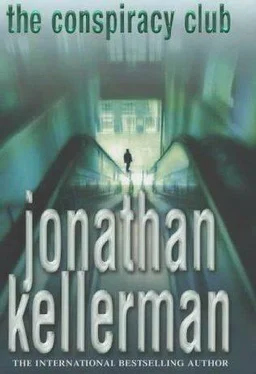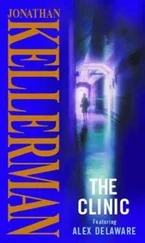“It’s good to see you, Doc.”
“Good to see you, too.”
Doug cried.
Jeremy sat down by the bed, took hold of Doug’s hand again, and held it. Blue-collar guy like this, try it in any other situation and you’d be cruising for a bruising.
Seven years ago, Jeremy had done a lot of hand-holding.
Doug stopped sobbing, and said, “Fuck, that’s exactly what I didn’t wanna do.”
“I think,” said Jeremy, “that you can be excused a little emotion.”
“Yeah… oh, shit, Doc, this reeks! I got a baby coming; what the fuck am I gonna do ?”
Jeremy stayed with him for two hours, mostly listening, occasionally commiserating. The parents stuck their heads in after the first hour, saw Jeremy, smiled weakly, and left.
A nurse came in and asked Doug if he was experiencing pain.
“A little, in the bones, nothing heavy.” He rubbed his ribs and his jaw. The chart said his spleen was already enlarged, maybe dangerously so.
“Dr. Ramirez says you can have Percocet if you want.”
“What do you think, Doc?”
Jeremy said, “You know how you feel.”
“It wouldn’t be chickenshit?”
“Not hardly.”
“Yeah, then. Shoot me up.” Doug smiled up at the nurse. “Can I have some rum, too? Or a beer.”
She was a young one, and she winked. “On your own time, stud.”
“Cool,” said Doug. “Maybe Doc here’ll get me something refreshing.”
“Aiding and abetting?” said the nurse.
Everyone chuckled. Filling the time. The nurse shot Percocet into the IV line. The drug had no clear effect for a while, then Doug said, “Yeah, it’s taking the edge off- Doc, mind if I sleep?”
The parents and the wife were waiting right outside the door. Marika, short, pretty, with shaggy blond hair and stunned blue eyes. Her belly bore the swell of early pregnancy. She looked around sixteen.
She didn’t talk and neither did Doug’s father, Doug, Senior. Mrs. Vilardi talked for all of them, and Jeremy stayed with the family for another hour, filled his ears with weeping, stuffed his soul full of misery.
After that came the conference with Bill Ramirez, another twenty minutes answering the reasonable, caring questions of the night nurses, thinking out plans to be made for future psychological support, and, finally, charting.
When he finally stepped out into the hallway, it was early morning, and he could barely keep his eyes open.
He returned to his office to collect his raincoat and his briefcase, considered another go at the computer, thought better of it.
He drove home on autopilot, passing the now-dark façade of the Excelsior, gliding through empty, sepia streets, unaware of the moon, head blessedly free of thoughts and pictures.
Stumbling into his house, he managed to get out of his clothes before his feet gave way. He was deeply asleep before he hit the pillow.
He overslept, ate no breakfast, dressed as if donning a costume.
His first appointment was Doug Vilardi at eleven. The young man would be starting chemotherapy that afternoon. If that and more radiation didn’t bring about remission, the only option was a bone marrow transplant, and that meant transfer to another hospital, fifty miles away.
The decision to opt for treatment could have been agonizing. Treatment had saved Doug’s life, but it had also poisoned his bone marrow.
Doug hadn’t wavered. “What the fuck, Doc. What’m I supposed to do? Curl up and die? I got a baby coming.”
Not a particularly smart kid, not sophisticated or articulate. The challenge for Jeremy had been helping him put his thoughts into words. But once he’d gotten there, Doug had sailed.
Jeremy’s approach had been to ask about bricklaying.
“You should see, I built some walls, man. Some serious walls.”
Me too.
“Know that cathedral- St. Urban’s, over on the south end? The rectory on the side- the smaller building, it’s all brick, not like the church, which is stone? We repaired that, my company and me. Had all these curves, you look at it, think how’d they do that.”
Jeremy knew the cathedral, had never noticed the rectory. “And it came out good.”
“Better than good, man, it was… beautiful. Everyone said so, the priests, all of ’em.”
“Good for you.”
“It wasn’t only me, it was the whole crew. I learned from those guys. Now we got newer guys, and I’m teaching them. I gotta get back to work. If I don’t work I feel…”
Doug threw up his hands.
Jeremy nodded.
“My mom’s scared of them treating me. Says they caused my new problem. But what the fuck, Doc. What’m I supposed to do…”
Jeremy drove to the hospital thinking about the young man’s optimism. Probably something constitutional; from what Jeremy had seen, a positive outlook had little to do with your actual life experiences. Some folks saw the donut, others the holes.
That late-night supper said the old eccentrics were donut people. Survivors believing themselves worthy of linen and china and silver, three meats, foie gras, petits fours, the driest of champagnes.
The late-night supper had been the first fabulous meal Jeremy had enjoyed in… years.
Where did he fit in the donut-hole continuum?
Observer, ever the diarist.
When he got to his office, a note from the Head of Oncology was in his box.
JC: Perused your chapter. Here are a few suggestions but all in all, fine. When can we look forward to a completed manuscript?
Also in the box was a cardboard box, stamped BOOK RATE, and postmarked locally.
Inside was a hardcover book bound in forest green cloth.
THE BLOOD RUNS COLD:
Serial Killers and Their Crimes
by
Colin Pugh
Twelve-year-old copyright, British publishing house, no jacket, no details on the author.
Inside the cover was a penciled price-$12.95- and black, rubber-stamped, Gothic lettering that read Renfrew’s Central Book Shop, Used & Antiquarian, followed by the defunct store’s address and phone number.
He’d never thought of the place as having a name, let alone a number- could never recall hearing a phone ring as he browsed. He dialed the seven digits, got a “disconnected” message, and felt comforted.
His name and hospital address were typed on the carton. He checked inside for a card or message, found none, flipped the book’s pages.
Nothing.
Turning to the first chapter, he began reading.
Fifteen chapters, fifteen killers. He’d heard of most of them- Vlad the Impaler, Bluebeard, the Boston Strangler, Ted Bundy, Son of Sam, Jack the Ripper (the chapter on the Whitehall fiend confirmed Jeremy’s graffiti recollection; the exact wording of the chalked scrawl had been: “The Juwes are the men That Will not be Blamed for nothing” ). A few he hadn’t: Peter Kurten (“the Dusseldorf Monster”), Herman Mudge, Albert Fish, Carl Panzram.
He lapsed into skimming. Details of the outrages blurred and the perpetrators merged into one ghastly mass. For all their grisly work, murderous psychopaths were a boring bunch, creatures of morbid habit, forged from the same twisted mold.
The final chapter caught Jeremy’s eye.
Gerd Dergraav: the Laser Butcher.
Dergraav was a Norwegian-born physician, the son of a German diplomat father stationed in Oslo and a dentist mother who abandoned the family and moved to Africa. A brilliant student, young Gerd studied medicine and qualified as both an otolaryngolist and an ophthalmologist. Shifting interests, yet again, he served as a chief resident in obstetrics-gynecology at the Oslo Institute for Female Medicine. The war years were spent doing research in Norway. In 1946, he took an advanced fellowship in the treatment of obstetric tumors in Paris.
Читать дальше












